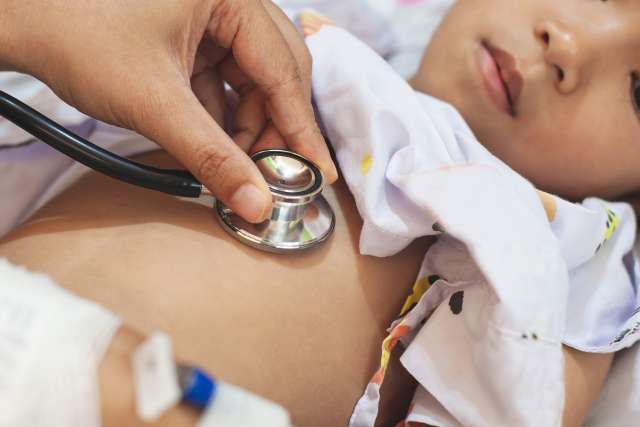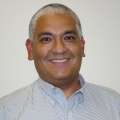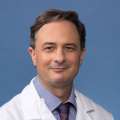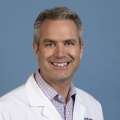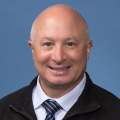Pediatric Cardiology
Our pediatric cardiologists provide comprehensive, expert care, with treatment success rates among the best in the country.

Why choose UCLA Health for pediatric cardiology?
Based in the UCLA Health Children’s Heart Center, our Division of Pediatric Cardiology provides comprehensive, expert care to babies and children. Whether your child is born with a heart condition or develops a heart problem later in life, our specialists have the skills and expertise to help.
Highlights of our pediatric cardiology services include:
- Comprehensive care from a team of experts: Our pediatric cardiology team is internationally recognized for exceptional care. We offer comprehensive cardiovascular care for the fetus, newborn, child or adolescent with any type of congenital or acquired heart disease.
- Seamless pediatric-to-adult transitions: Our pediatric cardiologists work closely with doctors in the Ahmanson/UCLA Health Adult Congenital Heart Disease Center. This partnership ensures a smooth care transition for adolescents and young adults with congenital heart disease.
- State-of-the-art technology: From our world-class pediatric cardiac catheterization laboratory to hybrid operating rooms, our specialists have access to the latest diagnostic and treatment tools. Your child benefits from advanced minimally invasive techniques and complex open procedures to treat congenital heart, valve and arrhythmia problems.
Our facilities and services
Our pediatric cardiologists work in multiple programs and clinics, including:
Children’s Heart Center
At the Children’s Heart Center, we care for children of all ages with any kind of heart disease. We offer initial appointments within 24 hours of referral, and all services are conveniently located under one roof. The Center includes:
- A warm and inviting waiting room and play area
- Five exam rooms
- A dedicated counseling room
- A state-of-the-art maternal-fetal suite
- An exercise testing and device area
The Children’s Heart Center is conveniently located next to the Ahmanson/UCLA Adult Congenital Heart Disease Center and steps away from UCLA Mattel Children's Hospital and Ronald Reagan UCLA Medical Center.
Congenital Heart Program
UCLA Mattel Children’s Hospital and have teamed up to enhance access to world-class pediatric congenital cardiac care for children and their families across Southern California. Building on their strengths, both institutions have created a joint pediatric heart program that will become a leading destination for diagnosing and treating the full spectrum of congenital and acquired heart disease.
UCLA Health, UCLA Mattel Children's Hospital and CHOC are nationally recognized for clinical excellence, quality and safety and have strong pediatric heart programs that provide a broad range of treatments and surgical interventions. UCLA Health and CHOC surgeons, pediatric cardiologists and intensivists already provide care and support at each other’s hospitals. They also collaborate on medical training programs.
Cardiac catheterization laboratory
We consistently rank among the top five programs in the country based on the U.S. News & World Report score for the number of patients we see in our pediatric catheterization lab.
As an active site for Food & Drug Administration (FDA) approved, multicenter clinical trials, we have innovated and improved upon many congenital heart disease devices and techniques. For example, we are one of the largest sites in the world that replaces heart valves using minimally invasive techniques.
Echocardiography laboratory
The echocardiography laboratory is a full-service, modern imaging lab. Each year, we perform thousands of heart ultrasounds (echocardiograms) on newborns, children and young adults. Our specialists also conduct research to advance imaging services and technology.
Cardiothoracic intensive care unit
Our pediatric cardiothoracic intensive care unit (CTICU) is a state-of-the-art critical care unit for infants and children with heart disease. We care for patients who have just had heart surgery, as well as those with nonsurgical conditions who need intensive care. In the CTICU, we also treat patients who need a heart-lung machine called extracorporeal membrane oxygenation (ECMO) or a mechanical pump to improve blood flow (ventricular assist device).
Adolescent Transitional Cardiology Care Program
We help children transition from children’s cardiology to adult care to ensure they don’t experience a lapse in care. Our goal is to empower adolescents and young adults to take charge of their own care.
Electrophysiology service
Our electrophysiologists diagnose and treat hundreds of children each year with irregular heart rhythms. They perform minimally invasive catheter ablation procedures and implant pacemakers and cardioverter defibrillators. These treatments offer optimal outcomes for many children and adolescents.
Our specialists also devise innovative approaches to specific procedures. For example, they helped develop a new way to implant pacemakers. Instead of an incision in the chest, we can make an incision in a child’s armpit, which leaves a less visible scar. We are one of only a handful of centers in the United States that collaborated to develop this approach.
Exercise testing
Our two cardiopulmonary exercise testing laboratories are an important tool in assessing heart disease. Exercise testing helps us evaluate a child’s heart both before and after surgery. It also helps determine if it’s safe for a child to participate in competitive sports. Children as young as 6 can participate in exercise testing.
Fetal Cardiology Program
Patients in our fetal cardiology program receive care from a multispecialty team, including experts in pediatric cardiology, pediatric cardiothoracic surgery, neonatal ICU (NICU), genetic counseling and maternal-fetal medicine. Patients come to us from all over California and beyond.
We use the most advanced imaging technology for fetal evaluation, such as fetal echocardiography. This high-resolution ultrasound screens for fetal heart problems. Our program is also accredited by the American Institute of Ultrasound in Medicine for fetal echocardiography.
When you’re referred to our program, our specialists spend time with you to educate and counsel you regarding your child’s care.
Heart Transplant and Heart Failure Program
We are a major referral center in the western United States for pediatric heart transplants. Our surgeons performed our first pediatric heart transplant in 1984, and they have performed hundreds since. The success and survival rates in our Pediatric Heart Transplant Program are exceptional and exceed the national average.
Heart Failure/Cardiomyopathy Program
This program is one of just a few in the country that is specifically dedicated to pediatric heart failure. Our involvement in research allows us to offer the latest techniques and technologies. This program helps prepare patients who may eventually require a heart transplant.
Pediatric Marfan and Aortopathy Clinic
We evaluate and treat children and young adults with suspected or diagnosed Marfan syndrome, a genetic disorder that affects connective tissues. Our experts work with specialists in ophthalmology, pediatric surgery, cardiothoracic surgery and orthopedics to provide comprehensive care.
Pediatric Lipid/Cholesterol Clinic
Through this specialized clinic, we evaluate and treat children with elevated fat and cholesterol (lipid) levels in their blood. High lipid levels can cause fat deposits (plaque) to build up in the arteries, increasing the risk for heart disease. Treatment may include exercise, dietary changes or cholesterol-lowering medications. We personalize care plans to meet each child’s needs.
Pulmonary Hypertension Program
Since 2005, the specialists in this program have offered exceptional care for children with high blood pressure in the lung arteries (pulmonary hypertension). We provide the most advanced treatment options and participate in clinical trials so that we can continue offering the latest therapies.
Pediatric heart conditions we treat
Our pediatric cardiologists treat a full range of pediatric heart conditions including:
- Arrhythmias: Irregular heart rhythms that occur when electrical signals in the heart don’t fire properly
- Cardiomyopathy: A disease that causes the heart muscle to thicken or enlarge, leading to inefficient blood flow
- Congenital heart disease: Any type of problem with the heart’s structure that exists at birth
- Marfan syndrome: A genetic disorder that affects connective tissue, often causing damage to the artery that carries blood from the heart to the rest of the body (aorta)
- Pediatric heart failure: A condition that occurs when the heart doesn’t pump blood as well as it should, often leading to health complications if left untreated
- Syncope: Brief loss of consciousness (fainting) that occurs when there is a temporary drop in blood flow to the brain
Tests & procedures we offer
Our pediatric cardiologists use a range of techniques to diagnose and treat heart disease in children. Common services we offer include:
Diagnostic testing
UCLA Mattel Children’s Hospital features a state-of-the-art pediatric noninvasive cardiology laboratory and pediatric echocardiography lab. Tests we offer include:
- Cardiac CT scans: Scans that combine a series of X-ray images taken from different angles into one image
- Echocardiography: Test that uses sound waves to create images of the inside of the heart in a fetus, newborn or child
- Cardiac MRI: Scans that use radio waves and a magnetic field to take detailed images of the heart
- Specialized MRIs: Techniques developed at UCLA Health that use a special dye to produce detailed 4D images of a beating heart, even in tiny babies
- Stress test: Test that measures heart activity while a child is exercising to learn more about their heart function
Minimally invasive procedures
We use minimally invasive procedures to treat a range of pediatric heart conditions. These techniques use smaller incisions and often lead to a faster recovery, less pain and reduced scarring.
Some of the most common minimally invasive techniques we use include:
- Angioplasty and stenting: Cardiologists use this technique to treat pulmonary artery stenosis and coarctation of the aorta, two types of congenital heart disease. We use a balloon to widen the pulmonary artery or aorta, then place a small tube (stent) to keep the artery open. This procedure restores proper blood flow.
- Balloon atrial septostomy: This procedure treats congenital heart conditions such as transposition of the great arteries (TGA), atrial septal defect (ASD) or patent foramen ovale (PFO). In these conditions, oxygenated blood can’t circulate correctly. For TGA, cardiologists use a balloon to widen a natural hole between the left and right side of the heart (foramen ovale). Opening this hole allows oxygenated blood to flow to the body. Doctors also use a balloon to widen an ASD or PFO and restore blood flow. We often use this procedure as a short-term treatment before surgery to correct these heart defects.
- Closures: Our doctors may be able to close holes in the heart using a minimally invasive procedure. Procedures can repair an atrial septal defect (ASD), ventricular septal defect (VSD), patent foramen ovale (PFO) and patient ductus arteriosus (PDA).
- Valvuloplasty: This procedure treats congenital heart problems such as aortic valve stenosis and pulmonary valve stenosis. We use a balloon to open a narrowed heart valve. The doctor inserts a long tube (catheter) with a deflated balloon at the end into the heart valve. When in place, the doctor inflates the balloon to restore blood flow.
- Transcatheter valve replacement: This procedure is typically done to replace the pulmonary or aortic valve in children with congenital heart disease. Cardiologists use a catheter to insert a replacement heart valve without removing the old one. The doctor inserts a catheter with a collapsed valve at the end through an artery. When in place, the new valve expands, pushing old tissue out of the way and taking over the work of the diseased heart valve.
Pediatric cardiothoracic surgery
UCLA Health is a regional referral center in the southwestern United States for pediatric cardiothoracic surgery. We provide unparalleled care for children with congenital heart disease. Our surgeons perform hundreds of congenital heart surgeries each year, half of which are within a child’s first month of life. And they help develop new therapies and improve existing ones.
Our pediatric cardiothoracic surgeons perform some of the most complex open-heart procedures for severe heart defects. They also work with interventional cardiologists to perform groundbreaking hybrid procedures for certain patients. These procedures combine open and minimally invasive techniques to provide a less-invasive treatment for congenital heart and valvular disease.
Some of the most challenging procedures we perform include:
- Arterial switch: An operation performed within the first few weeks of life to put the aorta and the artery that takes blood to the lungs (pulmonary artery) in proper position
- Norwood procedure: The first in a three-stage heart surgery to treat hypoplastic left heart syndrome (HLHS) and build a functioning circuit for blood flow in the heart
- Glenn operation: The second in the three-stage heart surgery to treat HLHS
- Fontan procedure: The third and final surgery to treat HLHS
- Ross procedure: Surgery to replace a damaged valve that controls blood flow from the heart to the body (aortic valve) using the valve that controls blood flow from the heart to the lungs (pulmonary valve)
If you would like to refer a patient to the UCLA Congenital Heart Program for congenital heart surgery or for discussion of surgical candidacy, please complete this .
Contact Us
Call the UCLA Children's Heart Center at to request an appointment with a pediatric cardiologist.
Find your care
Our pediatric cardiologists provide world-class care. To learn more about our services, call .
If you would like to refer a patient to the UCLA Congenital Heart Program for congenital heart surgery or for a discussion of surgical candidacy, please complete this .

